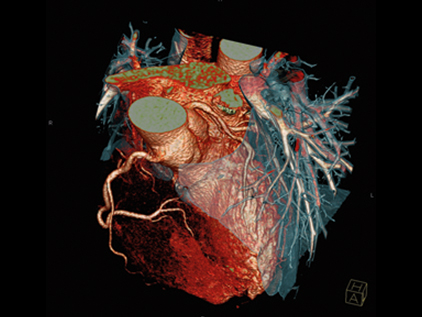- Home
- Conditions and Care
- Conditions
- Coronary Artery Disease
Coronary Artery Disease
Coronary artery disease, or CAD, is the most common type of heart disease. Coronary arteries carry blood, oxygen and nutrients to the heart. When they become damaged, narrowed or blocked, your heart no longer gets the amount of oxygen-rich blood it needs. This can result in life-threatening conditions, such as a heart attack.
The University of Kansas Health System in Kansas City offers all of today's most sophisticated diagnosis and treatment options for coronary artery disease. Our heart care specialists provide advanced care to those seeking coronary artery disease treatment in Kansas City and throughout the region.
What is coronary artery disease?
Coronary artery disease is often caused by narrow or blocked arteries. Plaque that builds up on the inner walls of your arteries, a condition known as atherosclerosis, causes the arteries to harden. Over time, these deposits accumulate and narrow the blood's pathways. When plaque thickens, it also can break off and form clots that stop blood flow altogether, causing a heart attack.
We offer a variety of appointment types. Learn more or call 913-588-1227 to schedule now.
Types of coronary artery disease
Many people associate coronary artery disease with blocked arteries, which is common. However, other issues can also be present in the coronary arteries. Types of coronary artery disease include:
Coronary artery disease symptoms and risks
Because there are different types of coronary artery disease, symptoms can also vary. Common signs of CAD include:
- Changes in exercise tolerance
- Chest pain, heaviness or tightness
- Fatigue
- Neck, jaw or arm pain with activity
- Shortness of breath
Since early symptoms of coronary artery disease are not always noticeable, you may not know you are at risk. Some patients are referred to our cardiologists when their primary care doctor recognizes the symptoms or risks of coronary artery disease, such as high cholesterol or blood pressure. You may also be diagnosed with coronary artery disease after you have a heart attack or other cardiac event. In this situation, you will receive a diagnosis and emergent care.
Coronary artery disease diagnosis and screening
Our cardiologists will run the appropriate tests to confirm coronary artery disease and discuss your treatment options with you. Many cases of coronary artery disease are diagnosed after a heart attack. Our goal is to identify blockages before they disrupt the heart's ability to function.
We offer a complete range of standard tests and innovative diagnostic and imaging tests for CAD, including SOMATOM® Definition Flash.

Rule out CAD in a flash
The University of Kansas Health System offers the SOMATOM Definition Flash – the fastest cardiac scanner in the industry. The noninvasive, low-radiation test can rule out coronary artery disease as the cause of chest pain in a split-second scan (.7 seconds) without breath-holding.
Learn more
Coronary artery disease treatment
Initially, your doctor may suggest medical management in the form of medicines, diet changes, exercise and other modifications that can decrease your risk for complications of coronary artery disease. In some cases, you may be able to manage early-stage coronary artery disease with lifestyle changes and medication. Others with more severe symptoms or advanced CAD are scheduled for heart surgery.
Doctors at The University of Kansas Health System use the most common current techniques to guide treatment of coronary artery disease:
- Angioplasty using drug-coated balloons to open the artery and keep it open
- Atherectomy to clear the artery mechanically
- Cryoplasty to freeze the artery tissue during angioplasty, helping to open the arteries and keep them open
- Laser technology to clear the arteries
- Minimally invasive surgery like balloon angioplasty and stenting to open the arteries with a minimally invasive approach so you can enjoy a faster recovery and shorter hospital stay
- The latest stent designs to keep the artery open
Maintaining your heart health after treatment is extremely important. The University of Kansas Health System offers a number of resources to help ensure your treatment is successful, including cardiac rehabilitation, dietary counseling, heart-healthy education and more.
Why choose us for coronary artery disease treatment
- Our heart surgery patients experience outcomes comparable with the very best programs in the United States.
- Our hospital was the first in the nation to earn Comprehensive Cardiac Certification from The Joint Commission.
- We offer complete, comprehensive care – including cardiac rehabilitation, nutritional counseling, educational resources and more – to help you manage your condition. Our surgeons are on the forefront of innovation and often participate in groundbreaking clinical trials.